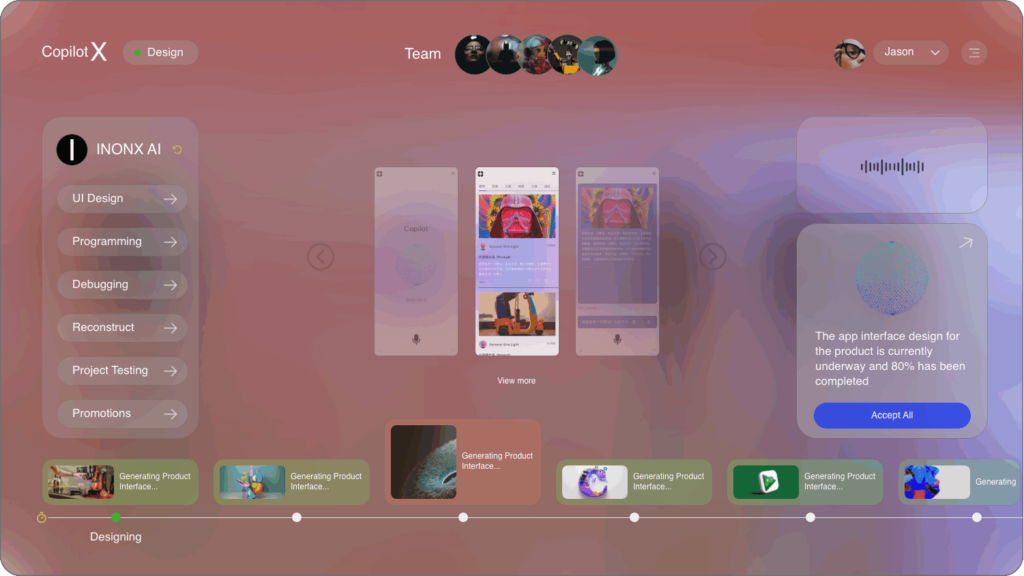As we move further into 2024, the field of artificial intelligence (AI) continues to produce groundbreaking advancements that are reshaping industries, enhancing user experiences, and tackling complex problem domains. This article delves into the latest AI large models, innovative tools and APIs, specialized technologies, and new products that are being introduced across key sectors such as healthcare, business automation, and education.
Recent months have witnessed significant development in the realm of large language models (LLMs). A notable entrant to this space is Google Gemini 1.5 Pro. Released in early January 2024, this model features robust multimodal capabilities, allowing users to seamlessly integrate and process varied types of data—text, images, and perhaps even audio—within a single workflow. This advancement enables richer interactions and insights from AI systems, making Gemini 1.5 Pro versatile for applications across different sectors. The extended context understanding of this model allows it to engage in deeper conversations, comprehend complex queries, and maintain contextual consistency over lengthy dialogues. This marks a significant leap forward in how AI can assist users, particularly in applications requiring nuanced understanding, such as healthcare diagnostics or customer service (Source: Google AI Blog).
Alongside these large models, companies are rolling out a new wave of tools and APIs that incorporate sophisticated AI capabilities. For instance, Qualys has unveiled its latest suite of security tools powered by AI, designed for enhanced visibility and threat detection. The platform integrates advanced risk assessment features with real-time analytics to identify vulnerabilities across networks. By utilizing AI to automate labor-intensive processes, organizations can achieve heightened security without existing resource constraints. Furthermore, Qualys’ integration with its online community management tools fosters shared knowledge, allowing users to benefit from collective experiences in cybersecurity incidents (Source: Qualys Press Release).
AI is also taking notable strides in specialized technologies that seek to refine and debias large language models. Emerging practices around Capsule Networks, a concept inspired by human perception, aim to enhance how AI understands spatial relationships and object characteristics. This technology helps tackle the issue of debiasing by enabling more ethical decision-making and lending context to AI outputs in sensitive applications such as hiring or legal recommendations. These advancements bring a layer of reliability to AI solutions, addressing long-standing concerns about bias in machine learning models (Source: MIT AI Research).
The landscape of AI products continues to evolve, especially in enterprise and creative industries. One innovative product launched this year is an AI-driven project management tool that leverages strong language processing capabilities to anticipate project needs, optimize resource allocation, and foster collaboration among teams. Companies employing this tool report enhanced efficacy in workflow management and a notable decrease in project timelines. By simplifying communication between teams and leveraging data to inform decision-making, AI is paving the way for businesses to operate more smoothly and effectively (Source: TechCrunch).
In the field of cybersecurity, several companies have introduced AI-based threat intelligence platforms. These platforms promise to autonomously analyze vast amounts of data to detect patterns indicative of cyber threats. With the rise of remote work and increasing reliance on cloud services, threats are evolving, and traditional security measures often fall short. By utilizing AI’s analytical capabilities, organizations can act swiftly to mitigate risks. In doing so, they maintain their security posture against a rapidly changing threat landscape (Source: Cybersecurity Ventures).
In healthcare, AI continues to demonstrate its transformative potential. New advancements in AI diagnostics provide clinicians with tools to analyze medical images with accuracy that rivals seasoned radiologists. By implementing deep learning algorithms that utilize large datasets, these AI models can assist in detecting conditions like cancer at earlier stages. This is particularly significant, as early diagnosis is often crucial for effective treatment. Furthermore, AI’s ability to analyze electronic health records ensures personalized treatment plans based on individual patient history and genomic data (Source: New England Journal of Medicine).
The education sector is also experiencing a renaissance fueled by AI innovations. In 2024, several startups are leveraging AI to create personalized learning experiences for students. Tools that adapt lesson plans and assessments based on individual learning styles and paces allow educators to engage students more effectively. For instance, AI tutors are being deployed in classrooms to provide one-on-one support tailored to each student’s unique needs. This shift not only enhances learning experiences but also helps address gaps in student performance and retention (Source: EdSurge).
Moreover, the potential applications of AI stretch into creative industries as well. Digital artists and designers are now utilizing AI tools to enhance their creativity, experimenting with generative AI that creates stunning visuals and designs through prompt-based inputs. These tools can serve as powerful allies in the creative process, allowing professionals to push the boundaries of their imagination and produce work that reflects a fusion of human ingenuity and machine-assisted artistry (Source: Wired).
As we explore these advancements, it becomes evident that artificial intelligence is not merely a tool for automation but a transformative force influencing how industries operate. From enhanced healthcare diagnostics to innovative cybersecurity measures and personalized education solutions, AI is redefining the landscape of human endeavor.
In summary, the advancements in AI as of 2024 promise not only to streamline processes and increase productivity across industries but also to resonate with ethical considerations and addressing biases. Companies like Google, Qualys, and innovative startups are driving this change, crafting tools that improve decision-making capabilities while enriching user experiences. As AI continues to evolve, its impact will undoubtedly intensify, shaping the future of technology and society.
Sources:
– Google AI Blog
– Qualys Press Release
– MIT AI Research
– TechCrunch
– Cybersecurity Ventures
– New England Journal of Medicine
– EdSurge
– Wired


























